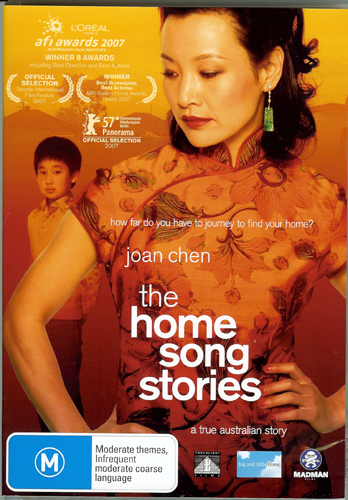The Home Song Stories (2007) |
|
The Home Song Stories (2007) |
|


|
| BUY IT |
| General | Extras | ||
| Category | Drama |
Featurette-Making Of-38.47 Deleted Scenes-15.41 (with Commentary) Interviews-Cast & Crew-Tony Ayres (19.09) & Joan Chen (20.08) Interviews-Cast & Crew-by At The Movies : Margaret and David Featurette-Screen Tests Joel Lok & Irene Chen (6.30) Theatrical Trailer-Australian (1.49) Theatrical Trailer-International (2.18) DVD-ROM Extras-Study Guide Gallery-Photo-Key Artwork |
|
| Rating |

|
||
| Year Of Production | 2007 | ||
| Running Time | 99:00 | ||
| RSDL / Flipper |
Dual Layered Dual Disc Set |
Cast & Crew | |
| Start Up | Menu | ||
| Region Coding | 4 | Directed By | Tony Ayres |
|
Studio
Distributor |
 Madman Entertainment |
Starring |
Joan Chen Yuwu Qi Joel Lok Irene Chen Steven Vidler Kerry Walker |
| Case | Amaray-Transparent | ||
| RPI | ? | Music | Anthony Partos |
| Video | Audio | ||
| Pan & Scan/Full Frame | None |
English Dolby Digital 5.1 (448Kb/s) English Audio Commentary Dolby Digital 2.0 (224Kb/s) |
|
| Widescreen Aspect Ratio | 1.85:1 | ||
| 16x9 Enhancement |
 |
||
| Video Format | 576i (PAL) | ||
| Original Aspect Ratio | 1.85:1 | Miscellaneous | |
| Jacket Pictures | No | ||
| Subtitles | English (Burned In) | Smoking | No |
| Annoying Product Placement | No | ||
| Action In or After Credits | No | ||
2007 was not a happy year to be at the movies watching Australian films. Don't get me wrong, there were several high quality films on offer. But from The Jammed to Noise there were a lot of weighty issues to consider. Growing up was also hard to do - particularly if you were from an immigrant background. Romulus, My Father was one "look back in sorrow" piece and The Home Song Stories was definitely another.
The Home Song Stories was written and directed by Tony Ayres, a Chinese born man who came to Australia in the 1960's. As he tells us in the monologue which bookends the film, his strongest memories are of the times with his mother - times of resilience and often unfathomable sadness.
If this all sounds a bit bleak then you are justly warned. The Home Song Stories is an experience with vastly more shade than light. What keeps the viewer engaged, as with Romulus, My Father, is a career defining performance in the lead and a series of excellent supporting roles. In this case Asian actress Joan Chen is at the top of her game with her performance as the mother, a character as endearing as she is unlikable, a genuinely loving woman with a fatal flaw a mile wide. As Chen points out in an interview which accompanies the film The Home Song Stories is slightly unique in that it really has no antagonist. Perhaps this can be taken further: the protagonist is also the antagonist.
Chen plays Rose Hong, a beautiful nightclub singer in Shanghai. It is 1964 and her two children Tom (Joel Lok) and Mae (Irene Chen) adore watching their mother sing. She has no husband but a lot of "uncles" who help her make ends meet. At a club she catches the eye of Bill (Steven Vidler), a sailor from Melbourne. In a flash they are together and Rose and family migrate to Victoria. The marriage lasts only a week and Rose and her children move to Sydney before returning, cap in hand, in the early 70's. Moving back in with Bill isn't easy as his mother, the dour Norma (Kerry Walker), is now firmly ensconced in the household. The two women battle for control of the house in the absence of Bill who has resumed offshore naval duties. At a local Chinese restaurant Rose meets Joe (Qi Yuwu), a young chef, and the pair become lovers. In a typically unwise move Rose brings Joe in to stay at the house and the pair are caught out by the triumphant Norma.
They hit the road again, this time with Uncle Joe, and the film charts their ups and downs (mainly downs) as Rose struggles with her own nature whilst trying to find a stable home for her children. Rose is a drama queen at heart and her instability becomes more pronounced as the film moves towards its conclusion. When Joe begins to show an interest in Mae the drama takes an even deeper step.
The byline for the film is: "How far do you have to journey to find your home?" and, if the film is an accurate guide that journey can last a lifetime. The Home Song Stories keenly charts the sometimes unbearable responsibilities placed on the kids by Rose who is as loving and protective of them as she is wilful and irresponsible. Director Ayres clearly grew up stronger as a result of his experiences and the film no doubt represents something of a catharsis for him. As his "character" says the film was made to understand, to punish, to remember, to forgive and to love her. He directs well although I felt that the grim tone of the film doomed even the happy scenes making it hard going at times. Still it is well acted, beautifully and accurately costumed and handsomely photographed. It is another high point for recent Australian cinema and deservedly dominated the recent AFI awards with gongs for direction, script, acting (Joan Chen), score, cinematography, editing, costume and production design.
Though bleak this is a film to remember. Everything about the film is high quality and it deserves a place in your DVD collection amongst other great Australian films.
The Home Song Stories was shot on 35mm film at an aspect ratio of 1.85:1.
This DVD release preserves that aspect ratio. It is 16x9 enhanced.
The film is on the first DVD with the extras on the second. Therefore, it is allowed full space to breathe and the image and sound benefits as a result. Having said that, the film has a specific look recreating the 1970's and it generally looks like a 70's film.
This is no unhappy accident. In the Making of feature cinematographer Nigel Bluck talks about the efforts made to make the film feel as if it belongs in that era. All in all the effect is well achieved. That means that there is a slightly grainy look to the film and the colours are pale greens and blues.
Technically the film is close to flawless. There are no compression issues. The print is clear of all artefacts.
I did not notice any aliasing.
The film contains some Chinese dialogue which is accompanied by subtitles burnt into the print.
| Sharpness | |
| Shadow Detail | |
| Colour | |
| Grain/Pixelization | |
| Film-To-Video Artefacts | |
| Film Artefacts | |
| Overall |
The Home Song Stories carries a Dolby Digital 5.1 soundtrack running at 448 Kb/s.
The dialogue is clear and easy to hear and understand. Although the accents of the cast are occasionally strong they enunciate well. Part of the dialogue is in Chinese. All appears to be in audio sync.
There are no technical problems with the soundtrack. The surrounds are used sparingly in the film although they do create a nice ambience. I can't recall the subwoofer doing too much.
The music is by composer Anthony Partos. Not only does he make good use of songs from the period, including traditional Chinese songs but he provides a series of themes which combine the Asian and Western influences and are shot through with melancholy, amply supporting the tone of the film.
| Dialogue | |
| Audio Sync | |
| Clicks/Pops/Dropouts | |
| Surround Channel Use | |
| Subwoofer | |
| Overall |
Director Ayres apologizes at the beginning of this commentary for his previous commentary. He needn't have bothered. This is a fine listening experience. Ayres not only charts the real world he grew up in but also the slow progress, sometimes joyous and sometimes painful, of bringing the film to the screen. The commentary track provides a clear insight into the characters and is indispensable for anyone wishing to study the movie.
Given the generous running time it is no surprise that this is a very detailed feature on the making of the film. Just about every one gets a look in here from director, cast through to key crew including the cinematographer who gets a chance to talk about the methods he used to get that 70's look. There is also a lot of on set footage. Definitely worth a watch.
The deleted scenes are well worth a watch. The commentary by director Tony Ayres suggests that most of the scenes were deleted because they gave a different edge to the story or telegraphed an issue too early. Two scenes are worthy of mention. One is with Joe and Mae on a "date" on the pier and the other is a further bookending device with the older brother and sister meeting up with a much older looking Joe. Ayres comments that they might appear in the Directors Cut if such a thing ever came into existence. That would be great as , to my mind, the scenes with Joe help round out the film better and the pier scene at least gives this interesting character even more depth.
Margaret Pomeranz of At The Movies conducts very lengthy interviews with Ayres and Chen. They are aired almost unedited giving a real chance for the pair to explain their motivations and methods in bringing this film and its troubled central character to life. Chen describes the role as one of the most complex of her 31 year career due to the difficulty getting to the core of her character. The advantage of the extended format is that it allows more material to come through. The disadvantage is that there are a few questions that start nowhere and go nowhere. Still, a great extra.
The kids did a good job in the film and this section of screen test shows them working through a few key moments.
The shorter Australian trailer is backed with a sad piano theme which captures the mood of the film. It stresses the drama and deep sadness of the film.
The longer international trailer uses the bookend of the older Tom looking back at his past. Whilst sad it attempts to convey the wider palette of the movie.
This is actually a pretty nifty extra. Coming as a PDF file it includes lots of photos, plot summaries and materials designed for teachers to test their students or at least create debate in the classroom.
This is a series of three posters for the film.
NOTE: To view non-R4 releases, your equipment needs to be multi-zone compatible and usually also NTSC compatible.
The film does not appear to have secured an overseas DVD release as yet. I can only hope this is not far away.
The Home Song Stories is another major achievement for Australian cinema.
It has been expertly transferred to DVD both sonically and visually.
The extras could not possibly be any more comprehensive.
| Video | |
| Audio | |
| Extras | |
| Plot | |
| Overall |
| Review Equipment | |
| DVD | Pioneer BDP-LX70A Blu-ray Player, using HDMI output |
| Display | Pioneer PDP-5000EX. This display device has not been calibrated. This display device is 16x9 capable. This display device has a maximum native resolution of 1080p. |
| Audio Decoder | Built in to amplifier/receiver. Calibrated with Ultimate DVD Platinum. |
| Amplification | Onkyo TX-SR605 |
| Speakers | JBL 5.1 Surround and Subwoofer |